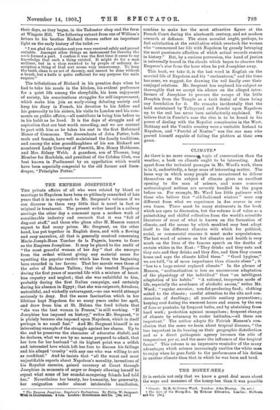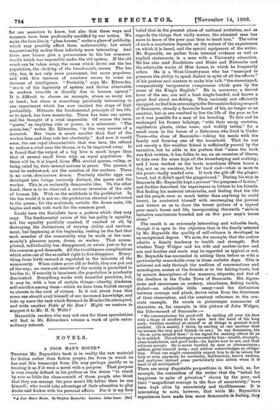THE HONEY.BEE.t IT is certain not only that we know
a great deal more about the ways and manners of the honey-bee than it was possible
• Climate. By B. de Conroy Ward. London : John Murray. [6s. net.] The Lore of the Honey-Bee. By Tlekner Ednaldes. London Metluan and Co. Le•Ll for our ancestors to know, but also that these ways and manners have been profoundly modified by our action. We make the bees live in "glass houses," under a glare of publicity, which may possibly affect them unfavourably, but which unquestionably makes them infinitely more interesting. And these new homes give a permanence to the bee common- wealth which was impossible under the old system. If the old comb can be taken away, the cause which drove out the bee population, the choking of the brood-comb, ceases. The bee city, too, is not only more permanent, but more populous, and with this increase of numbers seems to come an increase of intelligence. "Probably," says Mr. Edwardes, " much of the ingenuity of system and device observable in modern hive-life is directly due to human agency." It is difficult to choose an example, where so many are at band; but there is something peculiarly interesting in one experiment which has now reached the stage of high probability. Hitherto the fundamental principle of bee life, so to speak, has been monarchy. There has been one queen, and the thought of a rival impossible. Of course the term "queen," as implying rule or power, is a misnomer. " The queen-bee," writes Mr. Edwardes, "is the very reverse of a monarch. Her brain is much smaller than that of the worker-bees and they rule her absolutely." And now, it would seem, the one royal characteristic that was hers, the refusal to endure a rival near the throne, is to be improved away. It is found that the output of a big hive is much larger than that of several small hives with an equal population. So there will be, it is hoped, hives Mth several queens, ruling, or being ruled by, their several nations in peace. The queens, it must be understood, are the creation of the workers. There is no certa. dominarum domus. Precisely similar eggs are developed into beings curiously distinct, the queen and the worker. This is an eminently democratic idea. On the other band, there is to be observed a curious inversion of the rule of human life. With us the multitude is the proletariat. In the bee world it is not so ; the proletarian element is restricted to the queen ; for the multitude, outside the drone caste, life begins and ends with work for the common good.
Surely here the Socialists have a pattern which they may copy. The fundamental axiom of the bee polity is equality, not the equality painfully reached, if reached at all, by destroying the distinctions of varying ability and environ- ment, but beginning at the beginning, resting on the fact that each member of the community may be made at the com- munity's pleasure queen, drone, or worker. That accom- plished, individuality has disappeared, or exists just so far as the common good demands. All the troublesome complications which arise out of the so-called right to live disappear. Every- thing from birth onward is regulated in the interests of the community. When rulers grow old or feeble, they are put out of the way; no worn-out member of the society is permitted to burden it; if scarcity is imminent, the population is prudently diminished. Everything works with beautiful precision, but, it may be, with a loss of certain things—charity; kindness, self-sacrifice among them—which we have been foolish enough to elevate to the rank of virtues. Is it not about time that some one should avail himself of our increased knowledge, and take up anew the task which Bernard de Mandeville attempted, and write another Fable of the Bees ? Might we venture to suggest it to Mr. H. G. Wells Meanwhile readers who may not care for these speculations will find in Mr. Edwardes's volume a work of quite extra- ordinary interest.











































 Previous page
Previous page